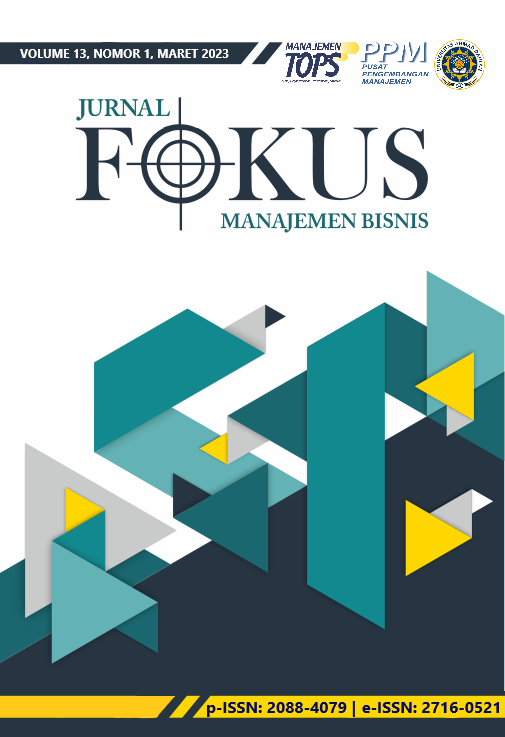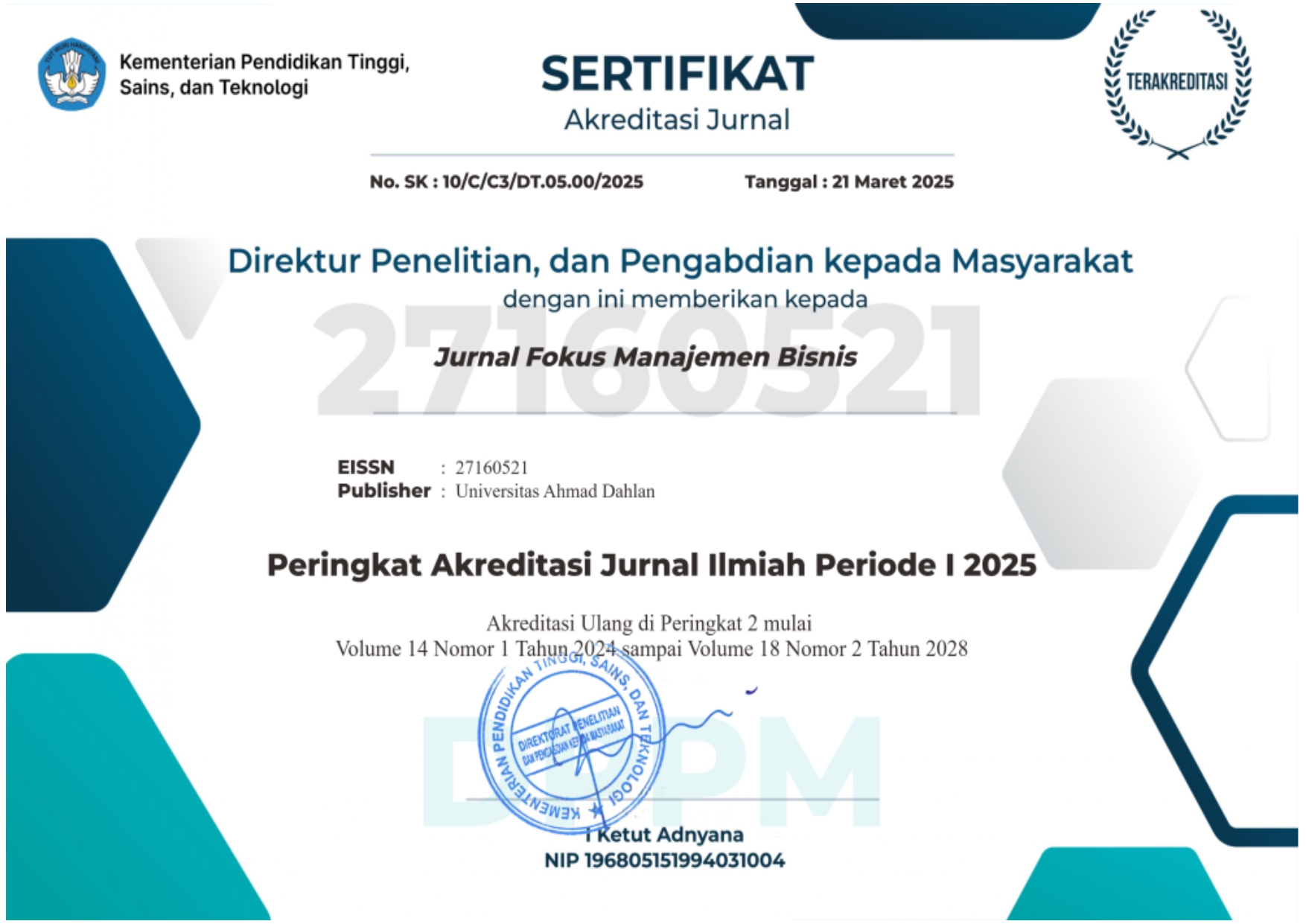ANTESEDEN PERILAKU KONSUMTIF DI MASA PANDEMI COVID-19
DOI:
https://doi.org/10.12928/fokus.v13i1.7686Abstract
The development of e-commerce provides many conveniences for shopping consumers. Consumers are increasingly familiar with the online shopping system since the emergence of the covid-19 pandemic, which limited people's mobility, including shopping. This study analyzes student consumerism behavior regarding self-control, peers, and socioeconomic status. The sample in this study amounted to 180 students. The sampling technique used simple random sampling with a questionnaire to collect respondents' answers. The results of this study prove that peers have a positive effect on consumptive behavior. However, self control and socio-economic status have no effect on consumptive behavior.
References
Barnet-Verzat, C., & François-Charles, W. (2008). Pocket Money And Child Effort at School. Economics Bulletin, 9(13).
Basrowi, & Siti, J. (2010). Analisis Kondisi Sosial Ekonomi Dan Tingkat Pendidikan Masyarakat Desa Srigading, Kecamatan Labuhan Maringgai, Kabupaten Lampung Timur. Jurnal Ekonomi & Pendidikan, 7(1).
Biswas, A. (2016). Impact of Cocial Media Usage Factors on Green Consumption Behavior Based on Technology Acceptance Model. Journal of Advanced Management Science, 4(2).
Cavallo, C., Sacchi, G., & Carfora, V. (2020). Resilience Effects In Food Consumption Behaviour at The Time of Covid-19: Perspectives From Italy. Heliyon, 6(12). https://doi.org/10.1016/j.heliyon.2020.e05676
Ch, T. R., Awan, T. M., Malik, H. A., & Fatima, T. (2021). Unboxing The Green Box: An Empirical Assessment of Buying Behavior of Green Products. World Journal of Entrepreneurship, Management and Sustainable Development, 17(4). https://doi.org/10.1108/WJEMSD-12-2020-0169
Chuang, Y. (2014). Self Control or Social Control Peer Effects on Temptation Consumption. Unpubl. Manuscr.
Fitriyani, N., Widodo, P. B., & Fauziah, N. (2013). Hubungan Antara Konformitas dengan Perilaku Konsumtif pada Mahasiswa Di Genuk Indah Semarang. Jurnal Psikologi Undip, 12, (1). https://doi.org/https://doi.org/10.14710/jpu.12.1.1-14
Fred, N. K. (2006). Asas-Asas Penelitian Behavioral. Gadjah Mada University Press.
Gailliot, M. T., & Baumeister, R. F. (2007). The Physiology of Willpower: Linking Blood Glucose To Self-Control. Personality and Social Psychology Review, 11(4). https://doi.org/10.1177/1088868307303030
Ghozali, I. (2018). Aplikasi Analisis Multivariate dengan Program IBS SPSS 25 (9th ed). Badan Penerbit Universitas Diponegoro.
Hair, J., Black, W., Babin, B., & Anderson, R. (2010). Multivariate Data Analysis: A Global Perspective. In Multivariate Data Analysis: A Global Perspective (Vol. 7th).
Heidbreder, L. M., Bablok, I., Drews, S., & Menzel, C. (2019). Tackling The Plastic Problem: A Review On Perceptions, Behaviors, And Interventions. In Science of the Total Environment (Vol. 668). https://doi.org/10.1016/j.scitotenv.2019.02.437
Hodari, D., Turner, M. J., Sturman, M. C., & Nath, D. (2020). The Role of Hotel Owners Across Different Management And Agency Structures. International Journal of Hospitality and Tourism Administration, 21(1). https://doi.org/10.1080/15256480.2018.1429342
Hofmann, W., Luhmann, M., Fisher, R. R., Vohs, K. D., & Baumeister, R. F. (2014). Yes, But Are They Happy? Effects of Trait Self-Control on Affective Well-Being and Life Satisfaction. Journal of Personality, 82(4). https://doi.org/10.1111/jopy.12050
Huete-Alcocer, N. (2017). A Literature Review of Word of Mouth And Electronic Word of Mouth: Implications For Consumer Behavior. Frontiers in Physiology, 8(JUL). https://doi.org/10.3389/fpsyg.2017.01256
Hurlock, E. B. (1978). (1978). Child Psychology. McGraw-Hill Publishing Company.
Iskandar, I., & Rahmayanti, R. (2018). Pengaruh Gaya Hidup, Kelompok Teman Sebaya, dan Literasi Ekonomi terhadap Perilaku Konsumsi. Jurnal Ilmu Manajemen dan Bisnis, 9(2). https://doi.org/10.17509/jimb.v9i2.19749
Iyer, G. R., Blut, M., Xiao, S. H., & Grewal, D. (2020). Impulse Buying: A Meta-Analytic Review. In Journal of the Academy of Marketing Science (Vol. 48, Issue 3). https://doi.org/10.1007/s11747-019-00670-w
Johan, I. S., Indriyani, R., & Vincēviča-Gaile, Z. (2020). Measuring Repurchase Intention on Fashion Online Shopping. SHS Web of Conferences, 76. https://doi.org/10.1051/shsconf/20207601015
Khar, M. A., & Irfan, M. (2021). The Impact of Socioeconomic Factors On Consumer Buying Behavior: A Case of Mobile Phone Market of Pakistan. Indian Journal of Economics and Business, 20(4).
Kiuru, N. (2008). The Role of Adolescents’ Peer Groups In The School Context. University of Jyväskylä.
Kotler, P., Keller, K. L., Ang, S. H., Tan, C. T., & Leong, S. M. (2018). Marketing Management: An Asian Perspective. Pearson Education, Inc.
Loke, V., Choi, L., & Libby, M. (2015). Increasing Youth Financial Capability: An Evaluation of The MyPath Savings Initiative. Journal of Consumer Affairs, 49(1). https://doi.org/10.1111/joca.12066
Lukesi, E., Rahadjeng, E. R., & Satiti, N. R. (2021). Effect of Financial Attitudes, Financial Knowledge, Locus of Control, and Financial Self-Efficacy to Financial Management Behavior in Millennial Generation. Jamanika (Jurnal Manajemen Bisnis Dan Kewirausahaan), 1(1). https://doi.org/10.22219/jamanika.v1i1.16027
Luo, S., Gu, B., Wang, X., & Zhou, Z. (2018). Online Compulsive Buying Behavior: The Mediating Role of Self-Control and Neaative Emotions. ACM International Conference Proceeding Series. https://doi.org/10.1145/3230348.3230397
Mahoney, M. J., & Thoresen, C. E. (1972). Behavioral Self-Control: Power to The Person. Educational Researcher, 1(10). https://doi.org/10.3102/0013189X001010005
Mayer, K. U., Maas, I., & Wagner, M. (2011). Socioeconomic Conditions and Social Inequalities in Old Age. In The Berlin Aging Study. https://doi.org/10.1017/cbo9780511586545.009
Muniady, R., Al-Mamun, A., Yukthamarani Permarupan, P., & Binti Zainol, N. R. (2014). Factors Influencing Consumer Behavior: A Study Among University Students in Malaysia. Asian Social Science, 10(9). https://doi.org/10.5539/ass.v10n9p18
Murniatiningsih, E. (2017). Pengaruh Literasi Ekonomi Siswa, Hasil Belajar Ekonomi, Dan Teman Sebaya Terhadap Perilaku Konsumsi Siswa SMP Negeri Di Surabaya Barat. Jurnal Ekonomi Pendidikan dan Kewirausahaan, 5(1). https://doi.org/10.26740/jepk.v5n1.p127-156
Muslimin, F., Hanum, F., & Septia, A. Q. (2020). The Effect of Economic Literacy, Peer Groups, and Parents Socioeconomic Status Towards Studentsâ€TM Consumption Behavior. Dinamika Pendidikan, 15(1). https://doi.org/10.15294/dp.v15i1.23993
Niranjanamurthy, M., Kavyashree, N., & Chahar, S. J. D. (2013). Analysis of E-Commerce and M-Commerce: Advantages, Limitations, and Security Issues. International Journal of Advanced Research in Computer and Communication Engineering, 2(6).
Nurachma, Y. A., & Arief, S. (2017). Pengaruh Status Sosial Ekonomi Orang Tua, Kelompok Teman Sebaya dan Financial Literacy terhadap Perilaku Konsumtif pada Siswa Kelas XI IPS SMA Kesatrian 1 Semarang Tahun Ajaran 2015/206. Economic Education Analysis Journal, 6(2).
Pearson, M. R., Kite, B. A., & Henson, J. M. (2013). Predictive Effects of Good Self-Control And Poor Regulation On Alcohol-Related Outcomes: Do Protective Behavioral Strategies Mediate? Psychology of Addictive Behaviors, 27(1). https://doi.org/10.1037/a0028818
Prasetia, M. A., Wijaya, C., & Mardianto, M. (2021). The Effect of Self-Control And Conformity On Student Consumptive Behavior of Ar-Rahman SMA Medan Year 2020. International Journal Of Education, Social Studies, And Management (IJESSM). https://doi.org/10.52121/ijessm.v1i1.1
Redden, J. P., & Haws, K. L. (2013). Healthy Satiation: The Role of Decreasing Desire in Effective Self-Control. Journal of Consumer Research, 39(5). https://doi.org/10.1086/667362
Reitz, A. K., Zimmermann, J., Hutteman, R., Specht, J., & Neyer, F. J. (2014). How Peers Make a Difference: The Role of Peer Groups and Peer Relationships in Personality Development. European Journal of Personality, 28(3). https://doi.org/10.1002/per.1965
Romadloniyah, & Setiaji. (2020). Pengaruh Status Sosial Ekonomi Orang Tua, Konformitas, Dan Literasi Keuangan Terhadap Perilaku Konsumtif Dalam Prespektif Gender. EEAJ, 9(1). https://doi.org/10.15294/eeaj.v9i1.37224
Schivinski, B., Pontes, N., Czarnecka, B., Mao, W., De Vita, J., & Stavropoulos, V. (2022). Effects of Social Media Brand-Related Content On Fashion Products Buying Behaviour – A Moderated Mediation Model. Journal of Product and Brand Management, 31(7). https://doi.org/10.1108/JPBM-05-2021-3468
Shoham, A., & Makovec Brenčič, M. (2003). Compulsive Buying Behavior. Journal of Consumer Marketing, 20(2), 127–138. https://doi.org/doi.org/10.1108/07363760310464596
Song, M. (2016). Analysis of the Effect on Moral Education Exerted by Peer Groups Among College Students. https://doi.org/10.2991/sschd-16.2016.64
Strauss, K., Parker, S. K., & O’Shea, D. (2017). When Does Proactivity Have A Cost? Motivation At Work Moderates The Effects of Proactive Work Behavior On Employee Job Strain. Journal of Vocational Behavior, 100. https://doi.org/10.1016/j.jvb.2017.02.001
Sugiyono. (2017). Metode Penelitian Bisnis (Pendekatan Kuantitatif, Kualitatif, Kombinasi dan R&D) (S. Y. Suryandari (ed.); 3rd ed.). Alfabeta CV.
Sultan, A. J., Joireman, J., & Sprott, D. E. (2012). Building Consumer Self-Control: The Effect of Self-Control Exercises On Impulse Buying Urges. Marketing Letters, 23(1). https://doi.org/10.1007/s11002-011-9135-4
Togawa, T., Ishii, H., Onzo, N., & Roy, R. (2020). Effects of Consumers’ Construal Levels On Post-Impulse Purchase Emotions. Marketing Intelligence and Planning, 38(3). https://doi.org/10.1108/MIP-01-2019-0022
Triyaningsih, S. (2011). Dampak Online Marketing Melalui Facebook Terhadap Perilaku Konsumtif Masyarakat. Jurnal Ekonomi Dan Kewirausahaan, 11(2).
Turel, O., & Osatuyi, B. (2017). A Peer-Influence Perspective On Compulsive Social Networking Site Use: Trait Mindfulness as A Double-Edged Sword. Computers in Human Behavior, 77. https://doi.org/10.1016/j.chb.2017.08.022
Usman, O., & Izhari, N. (2020). The Effect of Family Environment, Peers, Self-Control and Financial Literacy on Consumptive Behavior of Students. SSRN Electronic Journal. https://doi.org/10.2139/ssrn.3638817
Wang, X., Yu, C., & Wei, Y. (2012). Social Media Peer Communication and Impacts on Purchase Intentions: A Consumer Socialization Framework. Journal of Interactive Marketing, 26(4). https://doi.org/10.1016/j.intmar.2011.11.004
Widiyanti, N. M. W., Sara, I. M., Aziz, I. S. A., & Wulandari, I. G. A. A. (2022). The Effect of Financial Literature, Electronic Money, Self-Control, and Lifestyle on Student Consumption Behavior. Journal of Tourism Economics and Policy, 2(1), 1–10. https://doi.org/doi.org/10.38142/jtep.v2i1.200
Yang, F., Tang, J., Men, J., & Zheng, X. (2021). Consumer Perceived Value And Impulse Buying Behavior on Mobile Commerce: The Moderating Effect of Social Influence. Journal of Retailing and Consumer Services, 63. https://doi.org/10.1016/j.jretconser.2021.102683
Zebua, A. S., & Nurdjayadi, R. D. (2001). Hubungan Antara Konformitas dan Konsep Diri Dengan Perilaku Konsumtif pada Remaja Putri. Phronesis, 2(2).
Downloads
Published
How to Cite
Issue
Section
License
Copyright (c) 2023 Dyah Fitriani, Hendro Setyono, Sarazfhiga Solehatin

This work is licensed under a Creative Commons Attribution-ShareAlike 4.0 International License.
Authors who publish with this journal agree to the following terms:Â
- Authors retain copyright and grant the journal right of first publication with the work simultaneously licensed under a Creative Commons Attribution License that allows others to share the work with an acknowledgment of the work's authorship and initial publication in this journal.
- Authors are able to enter into separate, additional contractual arrangements for the non-exclusive distribution of the journal's published version of the work (e.g., post it to an institutional repository or publish it in a book), with an acknowledgment of its initial publication in this journal.
- Authors are permitted and encouraged to post their work online (e.g., in institutional repositories or on their website) prior to and during the submission process, as it can lead to productive exchanges, as well as earlier and greater citation of published work (See The Effect of Open Access).







